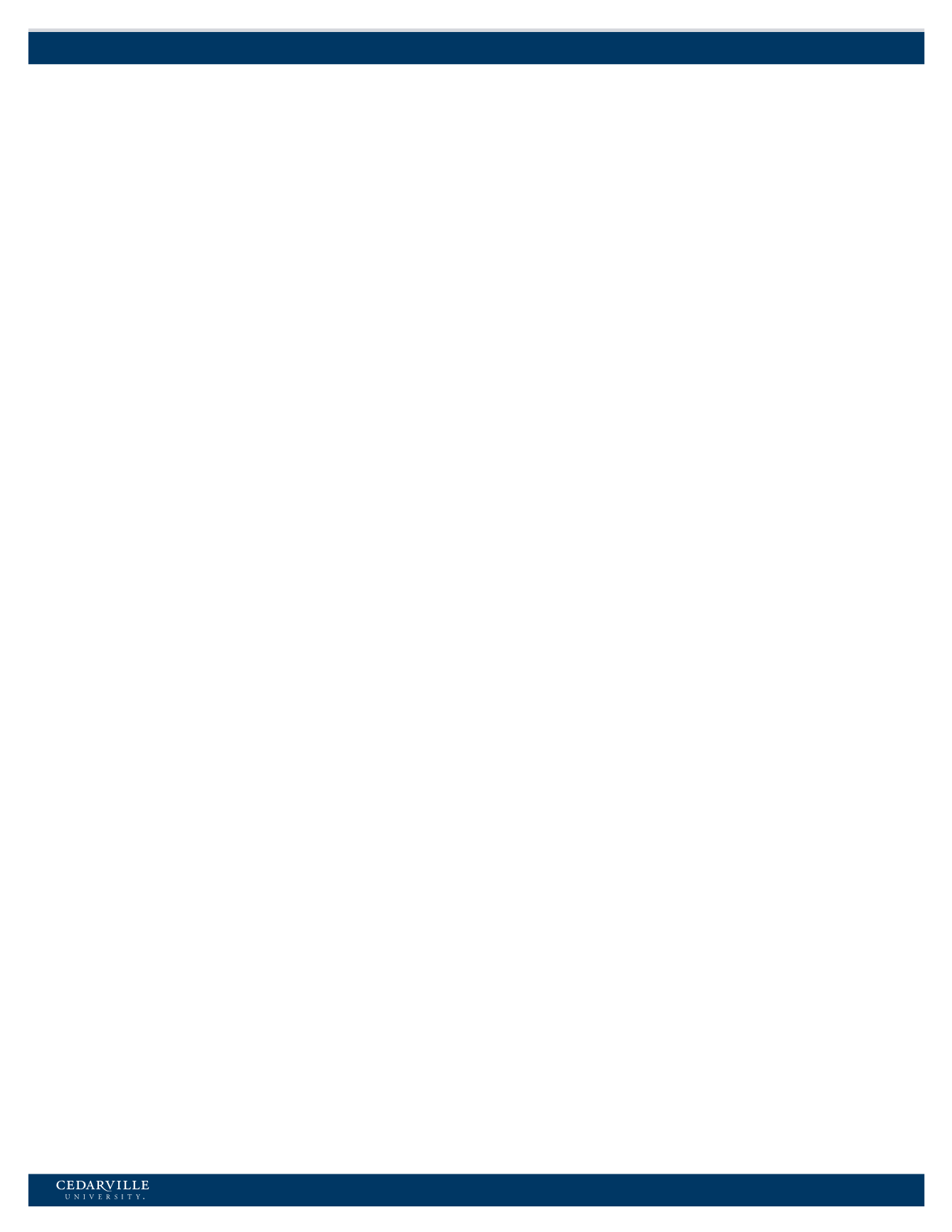

Page
54
2015–16 Graduate and Adult Programs Academic Catalog
Graduate-Level Course Descriptions
PHAR-6251 – PHAR-6273
PHAR-6251 Cardiology Module
5 hours
This course prepares the student to manage therapy of patients
with conditions or diseases affecting the cardiovascular system.
The course focuses on the application of principles through
a mixture of problem-based learning in small group settings,
simulation and labs, and expert consultations in a team-taught,
multidisciplinary environment. The course vertically integrates
pharmacology, medicinal chemistry, pharmacokinetics, anatomy,
physiology and pathophysiology, therapeutics, patient assessment,
epidemiology, and administrative and psychosocial-behavioral
issues involved in patient care. Over-the-counter, prescription,
herbal and nontraditional therapies, and non-drug therapies are
specifically included.
Prerequisites: PHAR- 6111 Research Design
and Methodology; PHAR-6130 Medicinal Biochemistry; PHAR-
6131 Pharmaceutical Sciences I;PHAR-6132 Pharmaceutical
Sciences II; PHAR-6133 Genetics and Pharmacogenomics;
PHAR-6134 Pharmacokinetics and Biopharmaceutics; PHAR-
6150 Drug Information and Informatics.
PHAR-6252 Renal and Gastrointestinal Module
5 hours
This course prepares the student to manage therapy of
patients with conditions or diseases affecting the renal and
gastrointestinal systems. The course focuses on the application
of principles through a mixture of problem-based learning
in small group settings, simulation and demonstration labs,
and expert consultations in a team-taught, multidisciplinary
environment. The course vertically integrates pharmacology,
medicinal chemistry, pharmacokinetics, anatomy, physiology
and pathophysiology, therapeutics, patient assessment,
epidemiology, and administrative and psychosocial-behavioral
issues involved in patient care. Over-the-counter, prescription,
herbal and nontraditional therapies, and non-drug therapies are
specifically included.
Prerequisites: PHAR-6111 Research Design
and Methodology; PHAR-6130 Medicinal Biochemistry; PHAR-
6131 Pharmaceutical Sciences I; PHAR-6132 Pharmaceutical
Sciences II; PHAR-6133 Genetics and Pharmacogenomics;
PHAR-6134 Pharmacokinetics and Biopharmaceutics; PHAR-
6150 Drug Information and Informatics.
PHAR-6253
5 hours
Women’s Health and Pulmonology Module
This course prepares the student to manage therapy of
patients with conditions or diseases affecting the reproductive
and pulmonary system. The course focuses on the application of
principles through team-based learning. This is complemented
with learning in small group settings, simulation and demonstration
labs, and expert consultations in a team-taught, multidisciplinary
environment. The course vertically integrates pharmacology,
medicinal chemistry, pharmacokinetics, anatomy, physiology and
pathophysiology, therapeutics, patient assessment, epidemiology,
and administrative and psycho-social-behavioral issues involved
in patient care. Over-the-counter, prescription, herbal and non-
traditional therapies, and nondrug therapies are specifically
included.
Prerequisites: PHAR-6111 Research Design and
Methodology; PHAR-6130 Medicinal Biochemistry; PHAR-
6131 Pharmaceutical Sciences I; PHAR-6132 Pharmaceutical
Sciences II; PHAR-6133 Genetics and Pharmacogenomics;
PHAR-6134 Pharmacokinetics and Biopharmaceutics; PHAR-
6150 Drug Information and Informatics.
PHAR-6254
5 hours
Infectious Disease and Immunology Module
This course prepares the student to manage therapy of
patients with conditions or diseases affecting the immune
system and/or caused by infection. The course focuses on the
application of principles through a mixture of problem-based
learning in small group settings, simulation and demonstration
labs, and expert consultations in a team-taught, multidisciplinary
environment. The course vertically integrates pharmacology,
medicinal chemistry, pharmacolinetics, anatomy, physiology
and pathophysiology, therapeutics, patient assessment,
epidemiology, and administrative and psychosocial-behavioral
issues involved in patient care. Over-the-counter, prescription,
herbal and nontraditional therapies, and non-drug therapies are
specifically included.
Prerequisites: PHAR-6111 Research Design
and Methodology; PHAR-6130 Medicinal Biochemistry; PHAR-
6131 Pharmaceutical Sciences I; PHAR-6132 Pharmaceutical
Sciences II; PHAR-6133 Genetics and Pharmacogenomics;
PHAR-6134 Pharmacokinetics and Biopharmaceutics; PHAR-
6150 Drug Information and Informatics.
PHAR-6255
5 hours
Endocrinology and Dermatology Module
This course prepares the student to manage therapy of patients
with conditions or diseases affecting the endocrine system or the
skin. The course focuses on the application of principles through
a mixture of problem-based learning in small group settings,
simulation and demonstration labs, and expert consultations in a
team-taught, multidisciplinary environment. The course vertically
integrates pharmacology, medicinal chemistry, pharmacokinetics,
anatomy, physiology and pathophysiology, therapeutics, patient
assessment, epidemiology, and administrative and psychosocial-
behavioral issues involved in patient care. Over-the-counter,
prescription, herbal and nontraditional therapies, and non-drug
therapies are specifically included.
Prerequisites: PHAR-6111
Research Design and Methodology; PHAR-6130 Medicinal
Biochemistry; PHAR-6131 Pharmaceutical Sciences I; PHAR-
6132 Pharmaceutical Sciences II; PHAR-6133 Genetics and
Pharmacogenomics; PHAR-6134 Pharmacokinetics and
Biopharmaceutics; PHAR-6150 Drug Information and Informatics.
PHAR-6260 Patient Care and Safety
2 hours
This course provides an introduction to patient assessment.
Topics include taking a medical history and review of systems,
cultural competency, health literacy, interpretation of laboratory
and diagnostic tests, documentation of patient care activities and
writing progress notes, therapeutic plan development, and patient
safety issues.
Prerequisite: P2 in good standing.
PHAR-6273
1 hour
Institutional Introductory Pharmacy Practice Experience I
Institutional Introductory Pharmacy Practice Experiences
(Institutional IPPE-I) in the second year of the professional
curriculum is designed to provide opportunities for students to
practice technical pharmacy skills in institutional settings and learn
about pharmacy management as well as clinical and distributive
functions. Students will demonstrate core practice skills:
communication, calculations, ethics, medication safety, managing
resources, wellness, health promotion, technology, informatics,
and critical thinking. Students in Institutional IPPE-I will meet with
an assigned preceptor for at least a four-hour period each week
for 14 weeks throughout the semester, totaling an estimate of 56
contact hours.
Prerequisite: P2 in good standing.



















